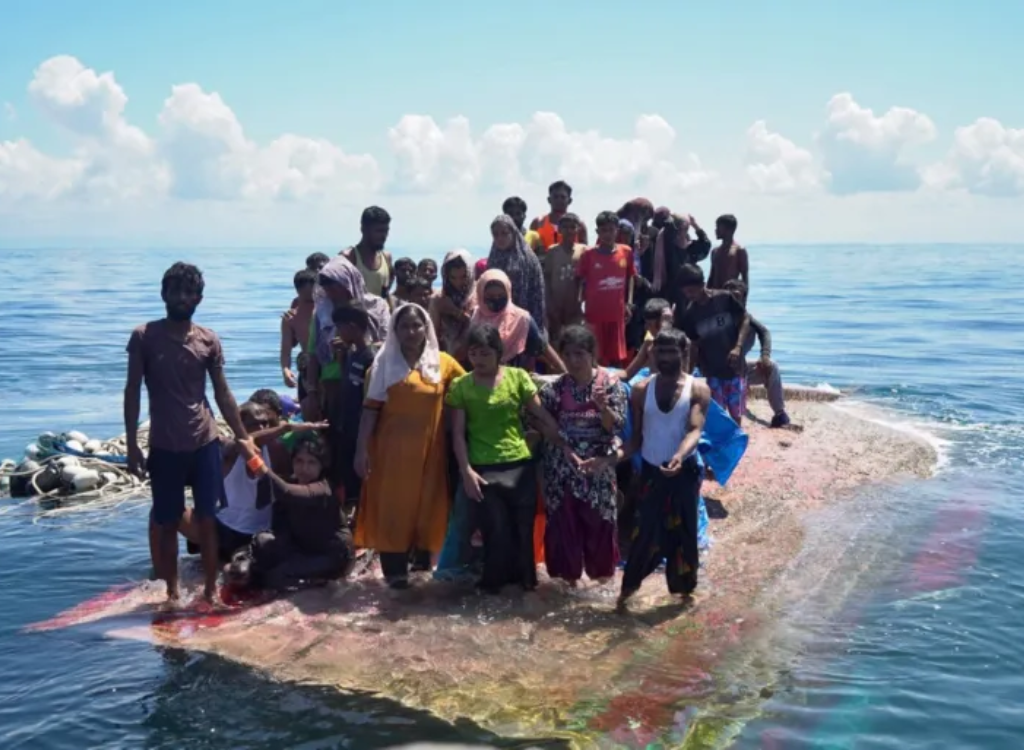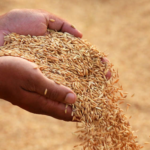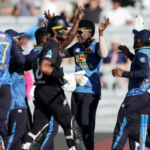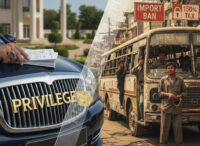Sri Lanka wants to send them back, but Myanmar doesn’t want to take them back and the Rohingya refugees currently stuck in Sri Lanka do not know what their future will be.
However, the official position of the Anura Kumara Dissanayake-led National People’s Power (NPP) government is not categorically clear about what stand they will take.
Two cabinet Ministers’ statements contradict each other with regard to dealing with the Rohingya refugees who are now detained at the Sri Lanka Air Force camp in Mullaitivu.
Minister of Public Security and Parliamentary Affairs Ananda Wijepala backtracked after initially saying “The government is considering deporting the Rohingya refugees”.
Speaking in Parliament on Wednesday (8), he went back on his earlier stand saying “they will be treated according to international law if they are identified as refugees”.
His change of stand has come after strong public opposition to forcefully send them back. Even the North East Coordination Committee staged a protest in Mullaitivu on Thursday (9) urging the government not to send them.
But his cabinet colleague and chief government whip Dr Nalinda Jayatissa says the issue is a complex one and has to be dealt with carefully.
“The Defence Ministry and the Foreign Ministry are working closely on this. This is an issue which has to be dealt with carefully. While considering the human rights of those refugees in a humanitarian way, we also need to focus on regional security. We are looking at intervening in this matter considering various issues. We need to consider all the aspects and act accordingly”.
Earlier this week, Minister Wijepala made it very clear that deporting them back is very much under the consideration of the government.
“Our Foreign Ministry is in touch with the Myanmar government and the list of those people lodged in the camps has already been shared with them”.
Adding further, Minister Wijepala told local journalists in Colombo, that the government would follow the legal process, engage in discussions with the Myanmar government, and as of now, are considering deporting them.
“The refugees would stay in Mullaitivu until discussions with relevant authorities conclude”.
But Dr. Jayatissa says the cabinet has discussed this issue in two successive meetings and that’s all he can share with the media while emphasizing the Foreign Ministry and the President in his capacity as Defence Minister is paying attention to the issue of the Rohingya refugees.
Journalists who attended the cabinet briefing were particular to know from Dr Jayatissa if a firm decision has been taken to deport them back.
“We cannot tell you about the decision taken for now. We are considering all aspects and acting accordingly. There are aspects like humanitarian angle, national and regional security”.
In the eyes of the Sri Lankan government it seems to be a case of human trafficking rather than considering them as refugees who fled Myanmar fearing for the safety of their lives.
Minister Wijepala while replying to Sri Lanka Muslim Congress leader Rauf Hakeem in Parliament said intelligence service has revealed there was a plan to bring about 100,00 illegal migrants into the country in the coming days.
He changed his stand during his reply in Parliament by saying “the government has not discussed deporting the group and that the Foreign Affairs Ministry had only held initial discussion with the Myanmar government.”
Critics say the Public Security Minister’s statement is nothing but ‘scaremongering’ and trying to avoid taking care of the refugees who are detained at the SLAF camp and want the minister to explain what according to him “the government considers this as a social issue in the country”.
SJB MP Mujibur Rahaman in his letter to the President said under the new government, forcefully deporting the first batch of refugees is like pushing them into the ‘death trap’.
Any such action by the Sri Lankan government would tarnish the reputation of the country in the eyes of the international community, his letter warns.
“Sending the first batch of refugees under your regime would be like sending them to the gallows and would be seen as a black mark in front of the nations around the globe”.
Mujibur Rahman in his letter also emphasized that such actions would endanger the lives of their relatives living in Myanmar.
“This will not only endanger the lives of these people but also their relatives and friends in Myanmar and that is our strong belief”.
He goes on to add that sending them back would amount to refoulement which is an international act gives protection to migrants fearing for their lives and will amount to breaching international laws and conventions.
Even three weeks after landing in Sri Lanka, the fate of the 103 Rohingya refugees and the 12 who steered the boat accused of human trafficking and released subsequently, hangs in a balance with their future very uncertain.
Human rights lawyers say although Sri Lanka is not a signatory to the refugee convention of 1951, the country has international obligations to fulfil.
They point out Sri Lanka is bound to act according to the non-refoulement law which is part of international obligations by nations.
According to the UN Human Rights Commission, “Under international human rights law, the principle of non-refoulement guarantees that no one should be returned to a country where they would face torture, cruel, inhuman or degrading treatment or punishment and other irreparable harm”.
This principle applies to all migrants at all times, irrespective of migration station.
The principle of non-refoulement forms an essential protection under international human rights, refugee and customary law.
“It prohibits States from transferring or removing individuals from their jurisdiction or effective control when there are substantial grounds for believing that the person would be at risk of irreparable harm upon return, including persecution, torture, ill treatment or other serious human rights violations,” the UN Human Rights Commission explanation and guidelines say.
Even officials of the Human Rights Commission of Sri Lanka (HRCSL) were stopped by the immigration department from meeting the refugees to ensure their well-being. However, the chief of Immigration and Emigration expressed regret to the HRCSL for stopping them under fear of health and safety concerns.
Minister Wijepala, in yet another backtracking, has now said that HRCSL will be allowed to visit them once quarantine formalities are over, with no clear timeline as to when the formalities will be over.
War-affected Tamil fishermen rescued them on 19 December off the Mullaitivu coast noticing their rickety boat was adrift in the Sri Lankan territorial waters.
The Sri Lankan Navy which subsequently intervened, found the boat worthy of travelling and escorted it to the Trincomalee Naval camp for further interrogations.
After the local Magistrate visited them at the camp, he ordered the refugees to be sent to the Mirihana detention centre, only to be sent back to Habarana and finally taken to the SLAF camp in Mullaitivu.
No explanation has come from the government why the court order was overlooked and the refugees were taken to Mullaitivu instead of Mirihana centre.
The Place called “Sri Lanka Air Force Station” at Mullaitivu where Rohingya refugees fleeing Myanmar are held, has been declared a ‘Temporary Detention Place’ from the 23rd of December, 2024, by Ravi Seneviratne, Secretary, Ministry of Public Security and Parliamentary Affairs.
A refugee speaking to local journalists as they arrived in Trincomalee said they live under a constant threat in a war zone in Myanmar and fled the country to save their lives and faced continued persecution.
Under international human rights law, the prohibition of refoulement is explicitly included in the Convention against Torture and Other Cruel, Inhuman or Degrading Treatment or Punishment and the International Convention for the Protection of All Persons from Enforced Disappearance.
Human Rights lawyers back the policy of non-refoulement and says the principle applies to these Rohingyas. They point out, “At the moment they are neither refugees nor asylum seekers. They were rescued and brought ashore and claim to be heading to another destination to seek asylum”.
So far the Rohingyas rescued by the Tamil fishermen have not sought asylum either with the Sri Lankan government or the UN refugee agency.
Related News:
Rohingya refugees: Rishad urges AKD to reconsider deportation order
Immigration officials apologize for blocking HRCSL visit to Rohingyas











Leave a comment